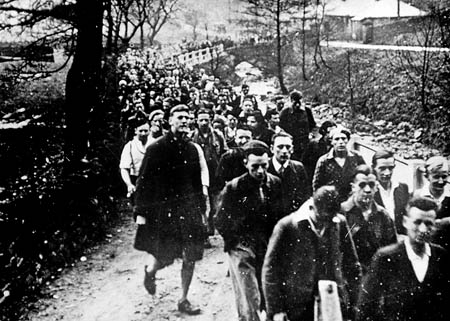One of the pioneers of access to Britain’s uplands has had a blue plaque unveiled in his memory.
Benny Rothman, a Manchester Communist, led the Kinder Scout Mass Trespass in April 1932 that led to his jailing along with four fellow trespassers.
Ramblers attended today’s unveiling of the plaque, which will be placed at his former home in Crofton Avenue in Timperley where he lived for 58 years.
Mr Rothman, who died in 2002, was the impromptu leader of the group that walked on to the Peak District’s highest hill Kinder Scout and was met by agents of the landowner, the Duke of Devonshire.
Following scuffles, six participants were arrested and five charged with unlawful assembly and breach of the peace, including Benny Rothman.
The trespass became a defining moment in the long journey towards securing access rights for walkers, culminating in the Countryside and Rights of Way Act in 2000, which gave walkers the right to walk over open countryside in England and Wales.

The then Environment Secretary David Miliband at the Kinder Mass Trespass 75th anniversay, with Natural England boss, the late Sir Martin Doughty
Benedict Southworth, Ramblers chief executive, said: “Thanks to dedicated campaigners like Benny Rothman, we can now all enjoy a walk over mountain and moorland.
“It’s hard to picture a time when the countryside in England and Wales was out of bounds to most people, but that’s what it was like in the 1930s.
“80 years on from the original Kinder trespass it’s wonderful that such an inspirational figure in the access movement is being recognised and remembered in this way.”
There is also a display of the life and achievements of Benny Rothman at Timperley Library in Greater Manchester.

hughwestacott
24 October 2012Interesting...but there is a great deal of myth surrounding the Kinder Scout mass trespass. Rothman was very much a johnny-come-lately and he was more interested in promoting his political views than working for greater access to the moors. The Federation of Rambling Clubs, the fore-runner of the the Ramblers' Association, advised its members to have nothing to do with the event,. There were many who believed that the mass trespass had put back access to the mountains by ten years.
Rothman and his followers only got as far as Ashop Head which, in his ignorance, he believed to be the summit of Kinder Scout, a fact that he acknowledged in an interview with the RA's Tom Stephenson. The 'trespassers' never strayed more than 100 yards from the path that they followed to Ashop Head which, even in those days, was a right of way.
The real heroes of the access movement were people like Bert Ward who worked tirelessly for many years in the cause of access to mountains and moors. Ward made such a nuisance of himself to the landowners that he was under a court injunction forbidding him to trespass on the grouse moors.
The only reason that Rothman and his followers became so famous was because of the savage prison sentence, and the disgraceful remarks of the sentencing judge who drew the attention of the jury to Rothman's foreign-sounding name.
Hugh Westacott